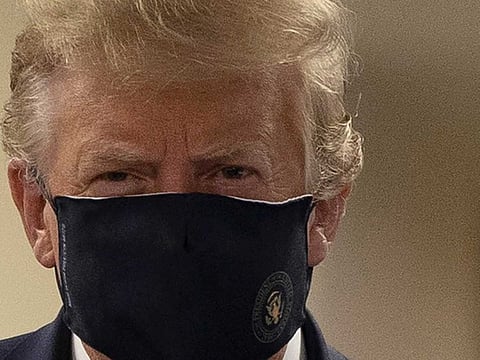It’s never too late to fight back against Covid-19
As Trump gets virus and deaths cross 1m, everyone must redouble efforts to battle disease

The mysterious strain of pneumonia that began spreading from Wuhan in late December last year has now officially claimed more than a million lives and emerged as possibly the world’s deadliest infectious disease.
Mankind has in the past battled the likes of plague, malaria, influenza, cholera and measles, and continues to fight against HIV, tuberculosis and hepatitis. But the new coronavirus is still growing faster than any other virus that humanity has ever known.
With Donald Trump and his wife Melania testing positive for Covid-19, it’s a grim reminder that not even the US President and his family are immune from the virus. As we have seen earlier with UK Prime Minister Boris Johnson and Brazil President Jair Bolsonaro, whether weak or powerful, rich or poor – this virus follows no boundaries. As world leaders rushed to wish Trump and Melania a rapid recovery, oil prices and markets plunged and uncertainty weighed high over the looming US presidential elections.
Ultimately, the solution lies with us – it’s up to us to keep practising safe hygiene, social distancing, following protocols especially when stepping out and being responsible not only for ourselves but for the entire community. The world will only be able to get a grip on the virus when everyone becomes an equal partner in fighting itGulf News
The World Health Organisation has further warned that the global coronavirus death toll could hit two million before an effective vaccine is deployed, and that the figure could soar even higher without concerted international action. While the US, India and Brazil continue to lead in the global caseload tally with more than 15 million infections between them, a resurgence of the virus across Europe has prompted dire warnings of national lockdowns again, even as winter approaches the northern hemisphere.
Human cost of the virus
The direct human cost of the virus is thus heartbreaking: more than a million loved ones gone too soon, snatched away by a virus that still doesn’t have a cure or a vaccine. The cost on countries and communities is equally devastating: the virus has sown poverty and unrest, rendered millions jobless, bankrupted companies and national economies and upended the world’s commercial, educational and social life.
But from the dark depths of despair comes hope. Countries like the UAE, China, South Korea, Germany and New Zealand have shown that it is possible to gradually reopen flights, businesses, schools and social entities while maintaining a strict vigil on the virus and limit infections through a combination of strategies. These include wide-scale testing, contact tracing, quarantining, social distancing, mandatory law for wearing masks, holding violators publicly accountable and remaining agile in responding to the ever-evolving situation.
Ultimately, the solution lies with us – it’s up to us to keep practising safe hygiene, social distancing, following protocols especially when stepping out and being responsible not only for ourselves but for the entire community. The world will only be able to get a grip on the virus when everyone becomes an equal partner in fighting it.



